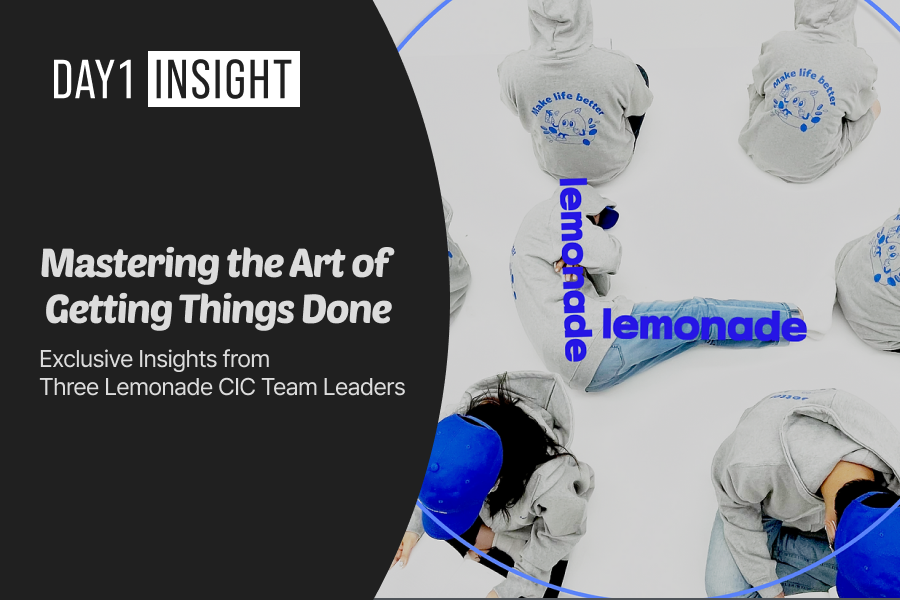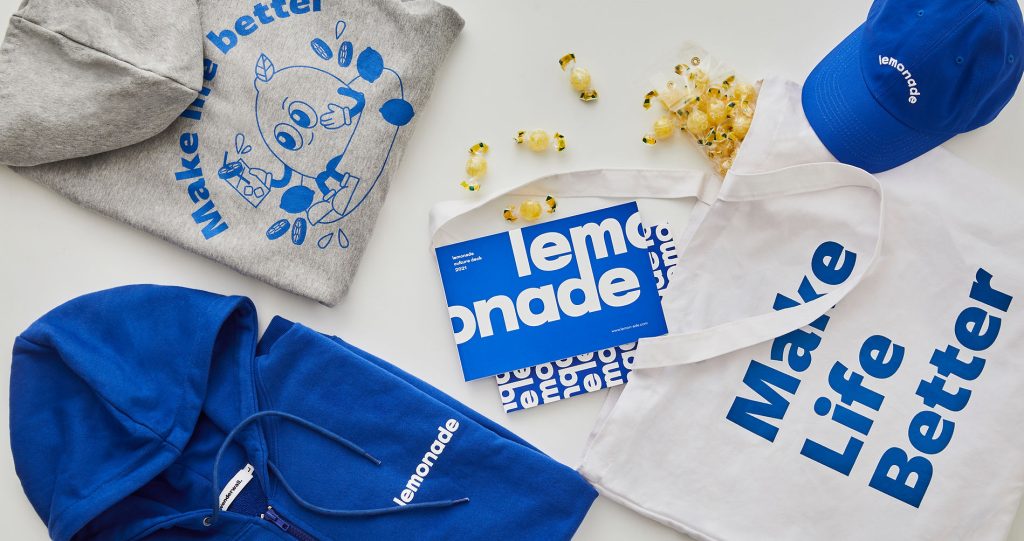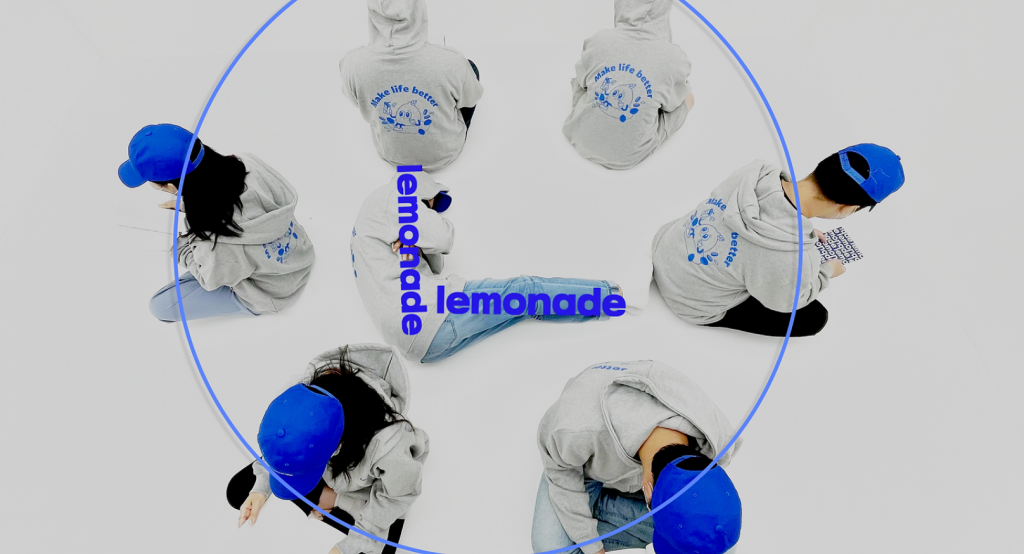Is There a Special DNA for Becoming a Team Leader?

“If you join Lemonade as a new marketer, within a year, you’ll be qualified to lead a team at another company. You’ll gain experience in both content and performance marketing—it’s like becoming the ultimate marketer.”
Tina Tsu (Head of Lemonade CIC)
This is how Tina, the head of Lemonade CIC, describes the key role of marketers at Lemonade. Whether it’s a humble brag or a declaration of intent to potential recruits, one thing is clear: the marketers at Lemonade are a different breed.
Intrigued by this, we sat down with a few of these “exceptional” marketers, all of whom have risen to team leader positions. We spoke with Lee Ji-sun, who leads the MyLight Team, Kim Jun-hyuk of the New Business Team 1, and Hwang Eun-song of the New Business Team 2. They came from different backgrounds, studied different subjects, and had different work experiences before joining Lemonade, but their approach to work is surprisingly aligned.
Lee Ji-sun | Team Leader, MyLight Team
The Pro at Promotions

Q: You joined Lemonade as a team member, and within a year, you were promoted twice to become the marketing team leader. Were you always a marketing prodigy?
A: Not at all. I majored in political science and even went to graduate school. After my undergrad, I worked in public opinion research but decided not to return to that field after completing my master’s. The market was small, and I didn’t like that I had to work exclusively with institutions like political parties or schools. I wanted to be in a role where I could build a team or run a business on my own, purely based on my skills. I enjoyed writing my thesis and considered doing a PhD, but it wasn’t political science itself that interested me—it was the challenge of convincing others. At one point, friends started asking me to help them with writing projects, which led me into content planning. These small projects eventually became part of my portfolio, which landed me a job at a marketing agency. They were looking for someone with a sense for content but who could also be trained as a performance marketer, and since I had experience in statistics, I was the right fit. So, I gave up my three to four years as a public opinion researcher and became a performance marketing rookie in my late 20s.
Q: What was your experience at your first job like, and how did you end up at Lemonade?
A: My first boss had a “sink or swim” mentality—he wanted to train only those who could survive being thrown into the deep end. As a result, everyone except me and one other person quit. But enduring that process helped me grow quickly. I received solid training in performance marketing, data analysis, and content planning. Later, the company merged with another marketing team, but the people on that team were extremely passive. I often heard things like, “Why are you doing so much? Just do what the client pays for.” But I had a different mindset. If I didn’t put in the same effort, our clients wouldn’t get the service they were used to, and their success reflected on my portfolio. So I decided to look for a more ambitious environment and moved in-house. I had several offers, but I chose Lemonade because it offered more freedom and allowed me to think beyond just performance marketing—I could also focus on content strategy.
Q: Were you always interested in language education?
A: To be completely honest, I wasn’t particularly drawn to language or education. I wanted to work in e-commerce. But Lemonade stood out because it excels in both content and commerce. Many e-commerce companies neglect product quality, but Lemonade doesn’t compromise on either its products or its marketing. Plus, the marketing and product teams share ideas and insights to execute our tasks more effectively, which I really appreciate.
Q: You’ve recently become a team leader at Lemonade. How are you finding this new role, and what kind of leader do you think you are?
A: I enjoy the process of broadening my perspective, not just as a marketer but as a leader who considers various business factors. I’ve also been tasked with managing people now, which I’m learning and leveling up at every day. I think a lot about how to align what my team wants with the company’s goals, how to motivate my team, and what each person’s strengths are. By nature, I’m someone who trusts and cares for people easily. But being a team leader means that sometimes I have to say things others don’t want to hear, which can be tough. In the first few months, I realized that simply being warm and friendly doesn’t truly help my team grow. If I get too close to my team, they may take negative feedback too personally. Also, when each team member struggles, I tend to absorb those emotions, which can drain the energy I need for work. So now I’m working on finding a better balance.
Q: What kind of team do you want to build in the MyLight Team, and what qualities do you look for in team members?
A: I want our team to be a place where anyone feels comfortable sharing ideas, and I’m working hard to create that culture. I often say, “When you come up with ideas, don’t worry about the budget or implementation. Just think freely, as if you were the customer.” I don’t want people to hold back out of fear that their ideas aren’t practical. If the idea is good, we can figure out how to make it work later. As for the kind of people I look for, I don’t have a personal preference for team members. But in our company, those who grow the fastest are people who have a hunger for experience. In startups, projects can move fast, and if things don’t work, we pivot quickly. If someone thinks, “I was just following orders, and now it’s all gone to waste,” it can weigh down the whole team. But those who take something away from each experience, no matter how the project turns out, grow rapidly. I like to meet people who view failed projects not as wasted effort but as opportunities to learn and grow.
Hwang Eun-song | Team Leader, New Business Team 1
A Living History, Growing Alongside the Company

Q: You started as a marketer at Fast Campus, then moved on to lead all marketing at Lemonade, and now you’re leading a new business. Tell us about your journey.
A: Before joining, I was part of a founding team that launched a design service platform with a university senior. Back then, digital marketing was just starting to take off, but there weren’t many experts around to learn from. Fast Campus was already offering digital marketing courses, and I thought, “This is the place where I can learn what I need,” so I applied. I originally applied as a content marketer, but they suggested I try performance marketing instead, which I had no experience in. They made the offer based on my background—I had written a book on big data with my professor in college. After about a year at Fast Campus, I found myself managing 30 to 40 ad campaigns. I felt like I wasn’t growing anymore—I was just getting through the workload. Then, an opening at Fast Campus Language (now Lemonade) came up, and I moved over. What attracted me was the opportunity to focus on a few key products and really elevate the marketing rather than constantly launching new ones. Over the next four years, I launched multiple language-learning brands and managed all marketing operations. Just as I was starting to feel burnt out, I was offered a chance to work on new business initiatives, which led to my current role.
Q: You went from leading all of Lemonade’s marketing to overseeing a new business team. Isn’t that a big shift? Is it difficult?
A: It’s not so much that the work is completely different—it’s more about where the brands I manage are in their growth stages. For example, with Gabyeon Haksupji, the brand had already achieved significant growth, so my job was to scale it even further. With new business, the brands are on the edge of survival, so whether they succeed or not rests on me. This changes how I approach the products entirely. There are no established playbooks, no accumulated know-how or legacy to rely on. I have to try everything, figure out what works, and build something from nothing. While the scale of my work may have gotten smaller, there’s much more to think about, and I enjoy the challenge of creating something entirely new. Honestly, at first, I thought, “I can’t do this. This isn’t right for me.” But I didn’t want to back down—it triggered my determination. I’ve always worked on well-established products, but now I want to bring a new business to life and contribute to Lemonade’s success again. A lot of my team members share this mindset, which makes even the impossible seem doable. The whole process is exciting, and I hope any new team members will share in that joy.
Q: You’ve been with the company since 2018, making you one of the longest-serving members. What has been the toughest moment in these five years?
A: Honestly, it’s always been tough, but if I had to pick, it would be when Gabyeon Haksupji became a major success in the market. It was a time of great achievement but also intense pressure. There were about five marketers in Lemonade back then. As the product gained traction, more work kept piling up, and we were short-staffed—I was working past midnight every day. Eventually, the company provided more support, and the staffing issues were resolved. But personally, I found managing a team of four to be much easier than suddenly leading a team of over a dozen people. Looking back, every moment has been a challenge, but I’ve never wanted to run away or quit. I’ve learned that the harder the process, the greater the sense of accomplishment. The thrill of overcoming challenges is addictive, and Lemonade offers plenty of challenges and rewards. I might feel stressed, but as soon as a great idea comes to mind or a new project excites me, the adrenaline kicks in, and the stress melts away. It’s these moments that keep me going.
Q: You’ve experienced the company’s rapid growth. What have you learned from that journey?
A: I’ve learned so much from being here for so long. I had experience launching a business with a friend before, but it felt more like running a shop than building a company. Here, I’ve developed an entrepreneurial mindset from a business perspective. A few years ago, I wanted to become a top specialist in marketing. But after working here, my mindset has shifted. Now, I think about strategy and business more than just creative marketing. I feel like, whether I’m at this company or not, I could succeed anywhere. If I leave, it won’t be for a job elsewhere—it’ll be to start my own business.
Q: You’ve been a team leader for three years. What’s your leadership style?
A: My style has evolved a lot since the early days. At first, I had a mindset of “If we all just do our jobs well, that’s all that matters.” I thought it was enough to give clear instructions and communicate error-free. But now, I’ve realized that, at the end of the day, work is done by people, and you have to care about them. I’ve started focusing more on how to naturally motivate my team through human interaction. Honestly, understanding other people’s minds is the hardest part of leadership. Everyone has work they don’t want to do or tasks they don’t understand the point of. You can’t just ask someone to work hard for the sake of the company. If a person’s personal sense of fulfillment isn’t being met, it’s hard to keep going. That’s why I spend a lot of time building consensus and explaining why the work matters. It’s a challenging process, but it’s essential. I try to create an environment where, even if the work is demanding, we can still have fun and enjoy the process.
Kim Jun-hyuk | Team Leader, New Business Team 2
Tough on the Outside, Warm on the Inside

Q: You turned down a job offer from a major corporation. Why did you choose to work as a marketer at a startup instead?
A: I got an offer for a sales management role at a large company after completing my internship and final assessment. The pay was great, but I felt like I’d hit a growth ceiling quickly in that environment, living the same routine every day. I wanted to grow fast and prove my abilities, and I saw marketing as a role where I could clearly show my results. For marketers, numbers tell the whole story—your performance is visible. This aspect of the job really appealed to me. Even if I eventually started my own business, marketing experience would be incredibly valuable. I also wanted to work somewhere that gave me a sense of responsibility and autonomy, where my growth could align with the company’s. So when I started applying for jobs again, I focused on startups.
Q: After working at a larger company, you joined Lemonade, which is relatively small. What drew you to this change?
A: I started working at 26 after finishing my military service, so I began my career a bit earlier than most men my age. By 30, I was already a team leader at my previous company. While I appreciated the title, I missed the chance to keep learning new marketing skills and trends. I didn’t want to spend all my time just managing and giving orders. So, I decided to switch jobs to focus more on hands-on work, and I joined Lemonade. After about a month, the SEO/SEM department was created, and I became a team leader again. While it wasn’t exactly the role I had initially aimed for, I didn’t have any objections. Once I was tasked with leading the team, I committed to doing my best to guide them and think more broadly.
Q: Now, you’re the team leader of New Business Team 2. How did you transition into this role, and how is it different from your previous work?
A: When I joined Lemonade, Tina (the head of Lemonade CIC) asked me what I wanted to do in five or ten years. I said I wanted to become a CMO, not just because it’s the top marketing position, but because I wanted to develop the ability to view business holistically, from a high-level perspective. I also mentioned that I was interested in eventually starting my own business. Later on, Tina suggested I take on the new business initiative, and I accepted. In my current role, the scope of work has expanded significantly. Before, my focus was on enhancing the marketing of established products. Now, I’m responsible for launching new brands, ensuring their success in the market, and growing them—similar to how Fast Track Asia launched Day1 Company and Lemonade CIC through company building. It’s no longer just about managing marketing but also overseeing external communications, contracts, goal-setting, and much more. It’s truly about running a business.
Q: What kind of leader are you?
A: Honestly, I come across as cold and strict. But that’s not who I am inside. Over the years, I’ve learned through experience that being too warm or lenient as a manager can lead to problems. If I let my emotions dictate my decisions or make exceptions for certain people, it creates inconsistencies that hurt the team in the long run. While I understand and empathize with my team’s challenges, on the surface, I only talk about results—specifically, sales. When I was a younger leader, I wanted to listen to and accommodate everyone, but that ended up stunting their growth and weakening the team’s overall atmosphere. If people think, “If I say it’s hard, I’ll get a pass,” it becomes a habit, and eventually, both the work and the team suffer. Nowadays, I try to strike a balance by hearing things but pretending not to sometimes (laughs).
Q: How would you evaluate Lemonade’s work culture?
A: Startups are generally fast-paced, but Lemonade is especially quick when it comes to decision-making and execution. I’ve learned a lot in this fast-moving environment. As a marketer, you don’t launch a masterpiece on day one—you execute quickly, analyze the market’s response, and adjust immediately. Lemonade’s work style is perfectly suited to this approach. I appreciate the speed and efficiency, but I can see how others might feel differently. If you prefer a steady, consistent pace and value stability in your daily routine, this place might feel overwhelming. But if you enjoy a certain level of autonomy and want the freedom to experiment with different ideas like it’s your own business, this is the place to be.
✍️Key Takeaways
- Even failed experiences can be valuable assets for career growth. Don’t be discouraged—reflect on the outcomes and believe that you can do better next time.
- The harder the journey, the greater the sense of accomplishment and personal growth when you reach your destination.
- To be a great leader, you must find a balance between setting high standards and showing genuine care. Too much of either won’t help your team grow.